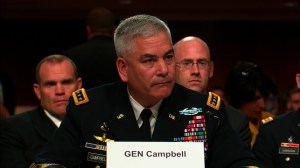The top commander of U.S. forces in Afghanistan said Tuesday he needs to adjust troop level recommendations because of recent developments in that country.

Gen. John Campbell told the Senate Armed Services committee that he has presented several options based on the assumption the U.S. was drawing down to a minimal number of troops by the end of 2017 — but he added that plans need to be changed.
“Based on conditions on the ground, I do believe we have to provide our senior leadership options different than the current plan we are going with,” Campbell said.
He did not provide any details about the troops levels he was recommending.
Campbell noted that with “an increased al Qaeda presence” and the “upsurge in insurgent violence” in some areas, there is a need to reconsider planning that was based on an outlook for force reduction last year.
“As a result, I’ve put forward recommendations to adjust this new environment while addressing our core missions: train, advise and assist the Afghan security forces and conduct counter-terrorism operations to protect the homeland,” Campbell told the committee.
At the start of his testimony, Campbell also said discussed the hospital that had been struck by mistake over the weekend and he offered assurances that “extraordinary efforts” were being made to protect civilians.
“We would never intentionally target a protected medical facility,” Campbell said.
The general said that it was a “U.S. decision” to provide air fire following a request for support from Afghan forces.
“This was a U.S. decision made within the U.S. chain of command,” he said, adding that “extraordinary efforts” were being undertaken to protect civilian loss of life.
He said an investigation into the bombing, which killed doctors and patients, was underway, and added that he had ordered new training to prevent similar incidents in the future.
“I must allow an investigation to take its course,” Campbell said. “I am sure that the investigations will be thorough, objective and transparent.”
The Taliban went into Kunduz with the goal of harming civilians, Campbell said. The United Nations estimates that 70% of civilian deaths have been at the hands of the Taliban, Campbell said.
Campbell said that while police were in Kunduz and the Afghan army was outside of the city, law enforcement was not prepared for the Taliban’s most recent attack.
“The Afghans, and quite frankly coalitions, were surprised when the Taliban were able to take over Kunduz City,” Campbell said.
Saturday’s bombardment of the Doctors Without Borders hospital in Kunduz sparked international outrage. It killed 12 medical staff members and at least 10 patients, three of them children, Doctors Without Borders said. Another 37 people were wounded, according to the global charity group, which works in conflict zones to help victims of war and other tragedies.
Every person who died at the hospital was Afghan, the group said.















